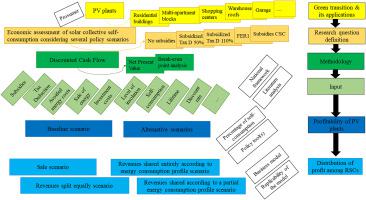Ecological Economics ( IF 7 ) Pub Date : 2022-05-25 , DOI: 10.1016/j.ecolecon.2022.107480 Idiano D'Adamo , Massimo Gastaldi , Piergiuseppe Morone

|
Solar photovoltaic (PV) systems can play a key role in ecosystems by satisfying the energy needs of people and businesses, helping countries become energy independent and propelling nations towards a climate-neutral future. Within this context, collective self-consumption (CSC) represents a new challenge, anchored in a new conception of the prosumer. The present work aims at calculating the economic profitability of PV systems with respect to both household and non-household self-consumers. The methodology is based on the calculation of net present value (NPV), with break-even point (BEP) analysis applied to the percentage of self-consumed energy. As economic viability is dependent on the specific policy tool(s) available, the analysis is applied to the Italian context, considering both a tax deduction of 110% over 5 years and a CSC subsidy of 100 €/MWh. The findings demonstrate economic profitability in multiple scenarios, strongly linked to the percentage of self-consumed energy. The mix of policy tools significantly influences the results and generates BEPs in the range of 8–13% (calculated in terms of the share of self-consumed energy) and NPVs ranging from 1035 to 3178 €/kW for 30–60% self-consumption. Profit distribution scenarios among renewables self-consumers (RSCs) and policy recommendations are provided to foster RSC development, and thereby make residents responsible for their country's energy transition.
中文翻译:

太阳能集体自我消费:政策组合的经济分析
太阳能光伏 (PV) 系统可以满足人们和企业的能源需求,帮助各国实现能源独立,推动各国走向气候中和的未来,从而在生态系统中发挥关键作用。在此背景下,集体自我消费 (CSC) 代表了一项新挑战,其基础是对产消者的新概念。目前的工作旨在计算光伏系统对家庭和非家庭自用消费者的经济盈利能力。该方法基于净现值 (NPV) 的计算,并将盈亏平衡点 (BEP) 分析应用于自用能源的百分比。由于经济可行性取决于可用的具体政策工具,因此该分析适用于意大利背景,考虑到 5 年内 110% 的税收减免和 100 欧元/兆瓦时的 CSC 补贴。研究结果表明,在多种情况下的经济盈利能力与自用能源的百分比密切相关。政策工具的组合显着影响结果并产生 8-13% 范围内的 BEP(根据自用能源份额计算)和 30-60% 自用能源的 NPV 范围为 1035 至 3178 欧元/千瓦。消耗。提供可再生能源自我消费者 (RSC) 之间的利润分配方案和政策建议,以促进 RSC 的发展,从而使居民对其国家的能源转型负责。政策工具的组合显着影响结果并产生 8-13% 范围内的 BEP(根据自用能源份额计算)和 30-60% 自用能源的 NPV 范围为 1035 至 3178 欧元/千瓦。消耗。提供可再生能源自我消费者 (RSC) 之间的利润分配方案和政策建议,以促进 RSC 的发展,从而使居民对其国家的能源转型负责。政策工具的组合显着影响结果并产生 8-13% 范围内的 BEP(根据自用能源份额计算)和 30-60% 自用能源的 NPV 范围为 1035 至 3178 欧元/千瓦。消耗。提供可再生能源自我消费者 (RSC) 之间的利润分配方案和政策建议,以促进 RSC 的发展,从而使居民对其国家的能源转型负责。


























 京公网安备 11010802027423号
京公网安备 11010802027423号